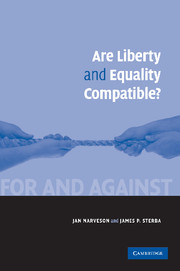3 - The right to liberty is incompatible with the right to equality
Published online by Cambridge University Press: 03 May 2010
Summary
The issue framed
Introduction
Probably the two most popular notions in normative social theory have been those of liberty and equality. But can we have them both? Or must we take our choice between them? That is our question – but it is not really a clear formulation. Might not someone in a position to promote equality be quite at liberty to choose either way, and choose equality? Of course. Might we be equally at liberty, and might that constitute equality in the relevant sense? Maybe. So long as we leave liberty and equality simply as ideas, it seems quite clear that the idea that we must “choose” between them does not have much plausibility. In many recent books, authors have urged the point that equality and liberty are compatible.1 But that is not what is at issue here. What is at issue is liberty or equality as possible requirements. Our subject is political principles, and politics is concerned, specifically, with the wielding of a certain kind of power. When someone has political power over someone else, the first is in a position to cause the other to be coerced into doing something, and coercion certainly cuts short the liberty of the coerced person, on the face of it.
- Type
- Chapter
- Information
- Are Liberty and Equality Compatible? , pp. 123 - 250Publisher: Cambridge University PressPrint publication year: 2010
- 1
- Cited by

